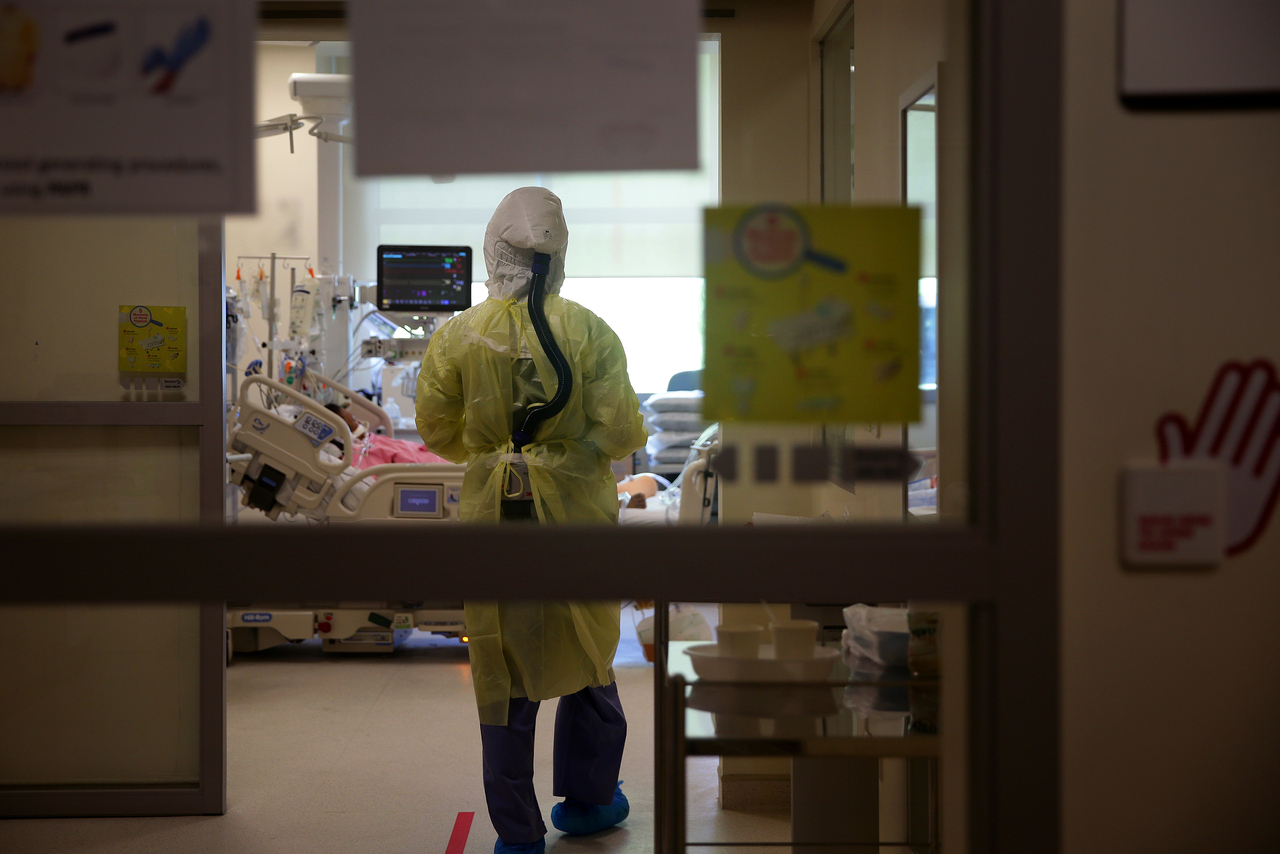Dip in Covid-19 ICU rate in Singapore could pave way for the vaccinated to mix more freely
Sign up now: Get ST's newsletters delivered to your inbox

In the ICU, 60 patients are hooked up to life support machines and 53 patients are under close monitoring.
PHOTO: ST FILE
SINGAPORE - The Covid-19 cases in the hospitals have come down slightly, with fewer patients in intensive care units (ICUs), paving the way for the vaccinated to mix a little more freely among themselves sooner rather than later, experts said.
However, the unvaccinated will likely have to continue living with tight restrictions, they added.
As at Thursday (Nov 18) - three days before the end of Singapore's month-long extension of pandemic restrictions - the number of hospitalised Covid-19 patients remained high, at 1,435.
In the ICU, 60 patients are hooked up to life support machines and 53 patients are under close monitoring.
The overall ICU utilisation rate as at Thursday here has slipped to 58.5 per cent, from 62.6 per cent a day ago and 67.1 per cent at the start of the month.
The ICU utilisation rate stood at 83.6 per cent on Oct 25.
This rate has come down partly because capacity was increased to 430 beds as at Nov 16, from around 360 in end-October.
"The hospitals have managed to create more capacity and also there are fewer people requiring ICU so there are twice as many empty beds as there were a few weeks ago," said Professor Dale Fisher, a senior consultant at the National University Hospital's Division of Infectious Diseases.
With less pressure on the healthcare system, the removal of restrictions is picking up pace, and if Singapore can keep the unvaccinated out of harm's way, then it can open up more, he said.
"There is good justification for the differentiated restrictions. I think there is no reason that the vaccinated can't start mixing more," he said.
"There will be many mild infections, similar to having a common cold, but disease progression will be rare in the vaccinated."
Professor Teo Yik Ying, dean of the National University of Singapore's Saw Swee Hock School of Public Health, agreed that the rules for the fully vaccinated can be less strict.
"I actually think Singapore can experiment with letting up to five fully vaccinated people socialise and dine out, and not just restrict these privileges to people from the same household," he said.
Operationally, this also reduces the burden on the eateries and restaurants having to verify the residential status of their customers.
Prof Teo stressed that any reopening has to be restricted to only those who are fully vaccinated.
"Those who have yet to be fully vaccinated - excluding children below 12 - should still be restricted from most activities in public spaces, for their own protection," he said.
This is because the fight against Covid-19 is far from over, and this can be seen elsewhere. There has been a resurgence of cases in North America and Europe, and strong measures were reintroduced to manage community transmissions, he said.
"So, if having some degree of restrictions allows a more sustainable strategy for small groups to socialise and to dine out, then I believe this will be a prudent compromise."
Private-sector infectious disease physician Asok Kurup said that while ICU capacity is an important metric, it is but one of the factors to consider.
"Easing up on measures will have to be rationalised, taking into account the capacity to provide adequate high acuity healthcare support for surges in Covid-19 cases, as well as continue to support the non-Covid-19 cases," he said.
The private sector is helping to care for some of the Covid-19 patients, and the unvaccinated and partially vaccinated ones do "consume a lot of resources", he said.
"Our healthcare workers are very tired. You have to do a balancing act to make sure that you are not short-changing the non-Covid-19 patients."
In the public sector, hospitals have had to postpone some less-urgent procedures.
About 5 per cent of Singapore's population has yet to be vaccinated, though they are eligible.
Globally, Covid-19 is clearly making its rounds across the unvaccinated people, more than the vaccinated people, said Prof Teo. It is thus likely that most of the unvaccinated population here will be exposed to the disease in the year ahead.
"And when infected, these people will disproportionately bear the burden of hospitalisation, severe disease, and death," said Prof Teo.

He expects restrictions to be gradually eased in the months ahead, though a key concern is a possible surge in influenza infections, especially as more travellers will be moving in and out of Singapore over the winter months of December, January and February.
Prof Fisher said: "People that have chosen to be unvaccinated have essentially chosen to be infected by Covid-19 and run the risk of severe disease. As more and more of them get infected, the majority will recover and have immunity similar to those vaccinated."
The main concern, he said, is if a large number of unvaccinated vulnerable people get infected at the same time. "That could stress the health system and is why Singapore is moving more slowly than other countries (in easing restrictions). It's much safer this way," he said.


